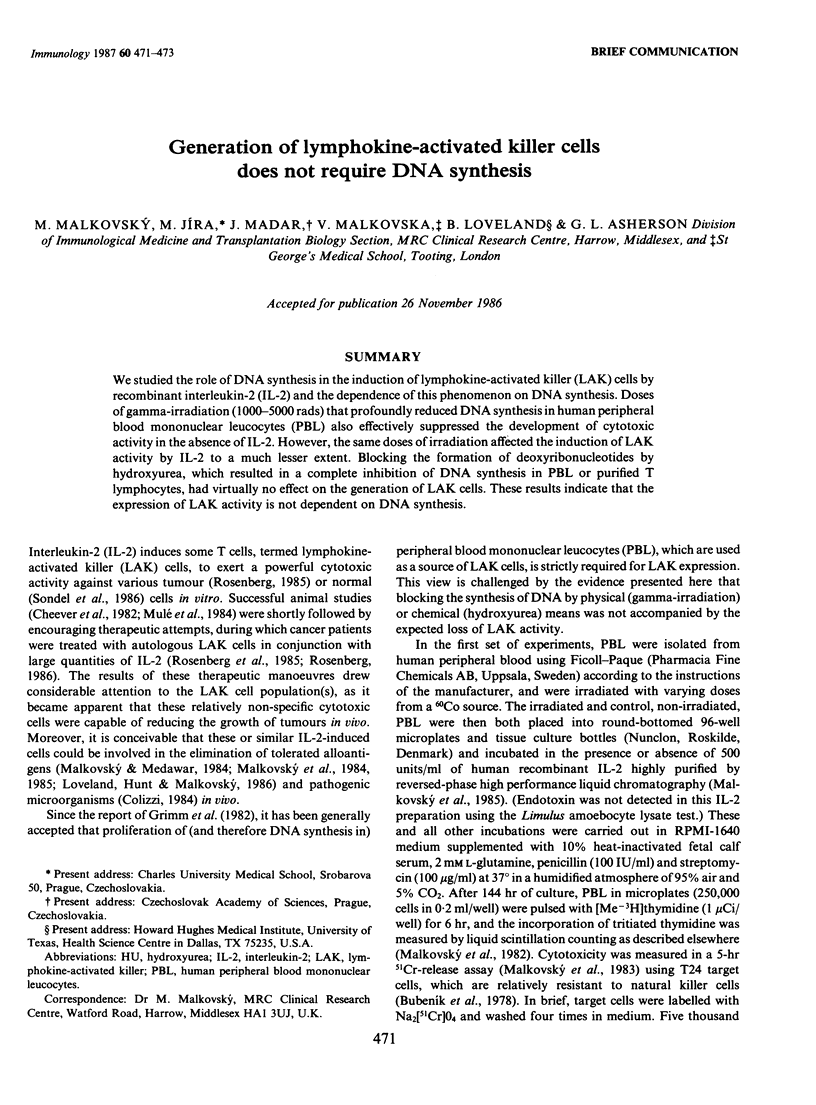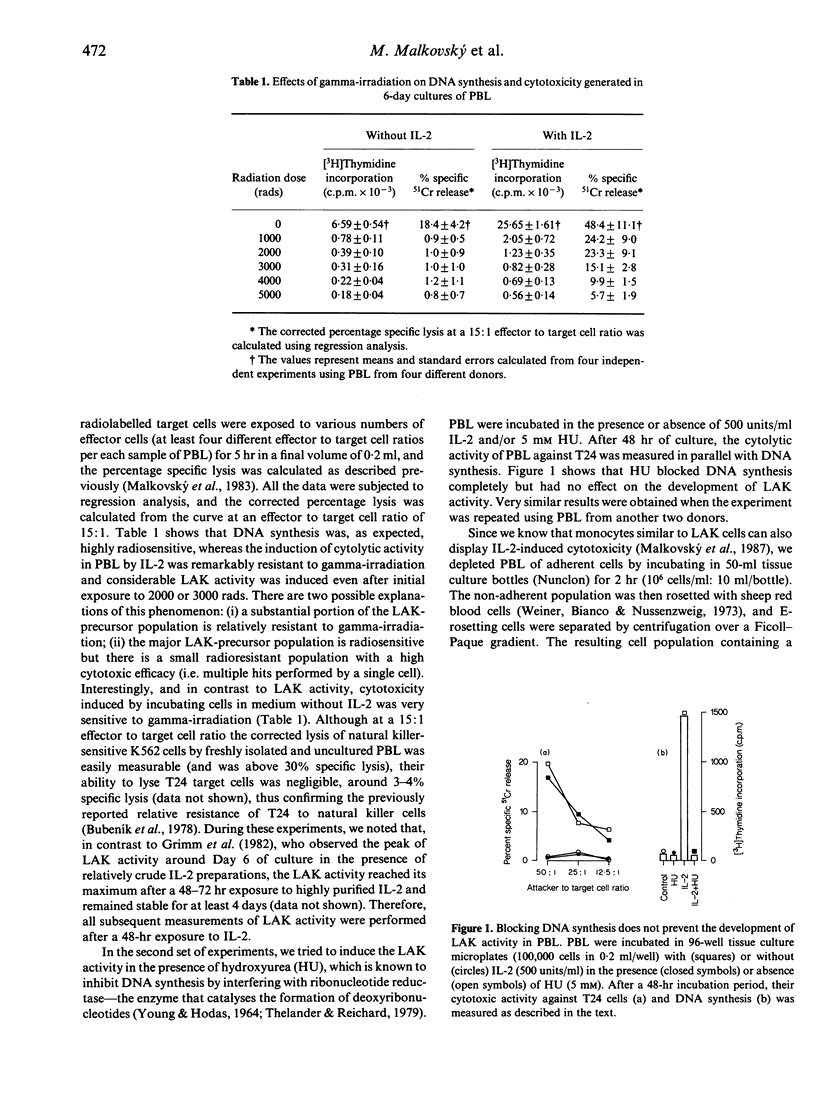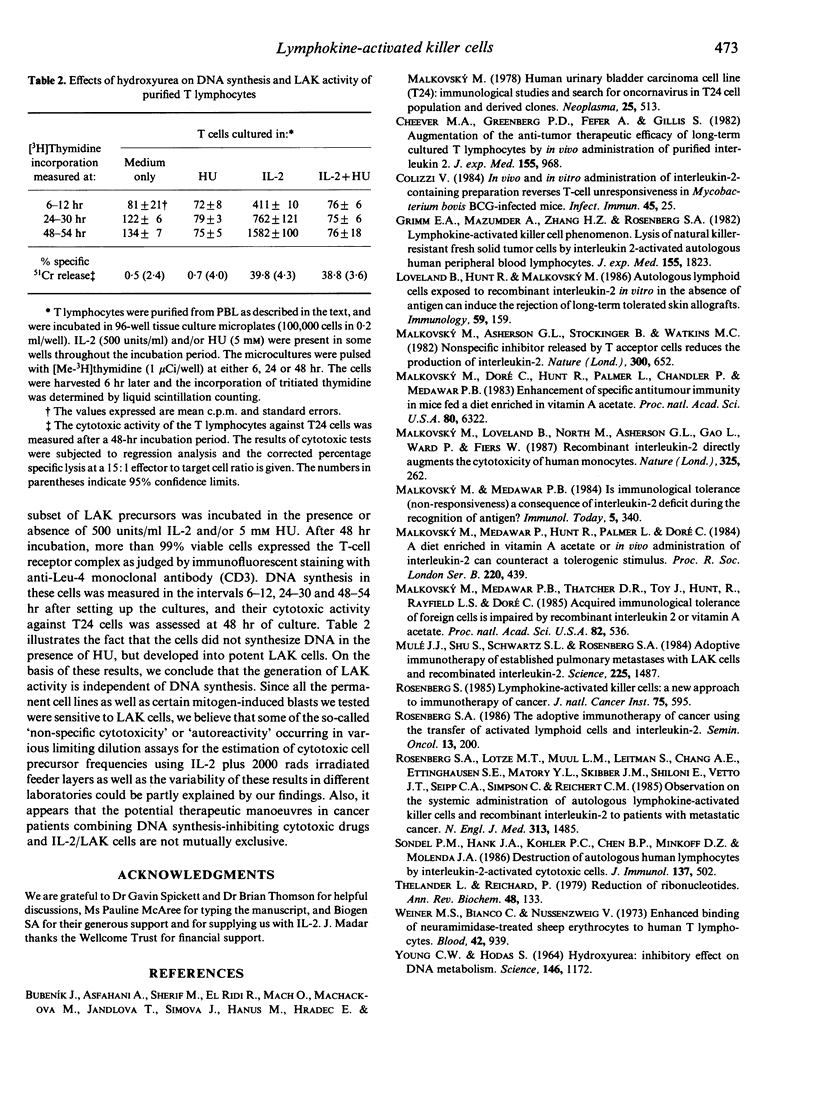Abstract
We studied the role of DNA synthesis in the induction of lymphokine-activated killer (LAK) cells by recombinant interleukin-2 (IL-2) and the dependence of this phenomenon on DNA synthesis. Doses of gamma-irradiation (1000-5000 rads) that profoundly reduced DNA synthesis in human peripheral blood mononuclear leucocytes (PBL) also effectively suppressed the development of cytotoxic activity in the absence of IL-2. However, the same doses of irradiation affected the induction of LAK activity by IL-2 to a much lesser extent. Blocking the formation of deoxyribonucleotides by hydroxyurea, which resulted in a complete inhibition of DNA synthesis in PBL or purified T lymphocytes, had virtually no effect on the generation of LAK cells. These results indicate that the expression of LAK activity is not dependent on DNA synthesis.
Full text
PDF


Selected References
These references are in PubMed. This may not be the complete list of references from this article.
- Bubeník J., Asfahani A., Sherif M., El Ridi R., Mach O., Machácková M., Jandlová T., Símová J., Hanus M., Hradec E. Human urinary bladder carcinoma cell line (T24): immunological studies and search for oncornavirus in T24 cell population and derived clones. Neoplasma. 1978;25(5):513–522. [PubMed] [Google Scholar]
- Cheever M. A., Greenberg P. D., Fefer A., Gillis S. Augmentation of the anti-tumor therapeutic efficacy of long-term cultured T lymphocytes by in vivo administration of purified interleukin 2. J Exp Med. 1982 Apr 1;155(4):968–980. doi: 10.1084/jem.155.4.968. [DOI] [PMC free article] [PubMed] [Google Scholar]
- Colizzi V. In vivo and in vitro administration of interleukin 2-containing preparation reverses T-cell unresponsiveness in Mycobacterium bovis BCG-infected mice. Infect Immun. 1984 Jul;45(1):25–28. doi: 10.1128/iai.45.1.25-28.1984. [DOI] [PMC free article] [PubMed] [Google Scholar]
- Grimm E. A., Mazumder A., Zhang H. Z., Rosenberg S. A. Lymphokine-activated killer cell phenomenon. Lysis of natural killer-resistant fresh solid tumor cells by interleukin 2-activated autologous human peripheral blood lymphocytes. J Exp Med. 1982 Jun 1;155(6):1823–1841. doi: 10.1084/jem.155.6.1823. [DOI] [PMC free article] [PubMed] [Google Scholar]
- Loveland B., Hunt R., Malkovský M. Autologous lymphoid cells exposed to recombinant interleukin-2 in vitro in the absence of antigen can induce the rejection of long-term tolerated skin allografts. Immunology. 1986 Sep;59(1):159–161. [PMC free article] [PubMed] [Google Scholar]
- Malkovsky M., Asherson G. L., Stockinger B., Watkins M. C. Nonspecific inhibitor released by T acceptor cells reduces the production of interleukin-2. Nature. 1982 Dec 16;300(5893):652–655. doi: 10.1038/300652a0. [DOI] [PubMed] [Google Scholar]
- Malkovský M., Doré C., Hunt R., Palmer L., Chandler P., Medawar P. B. Enhancement of specific antitumor immunity in mice fed a diet enriched in vitamin A acetate. Proc Natl Acad Sci U S A. 1983 Oct;80(20):6322–6326. doi: 10.1073/pnas.80.20.6322. [DOI] [PMC free article] [PubMed] [Google Scholar]
- Malkovský M., Loveland B., North M., Asherson G. L., Gao L., Ward P., Fiers W. Recombinant interleukin-2 directly augments the cytotoxicity of human monocytes. Nature. 1987 Jan 15;325(6101):262–265. doi: 10.1038/325262a0. [DOI] [PubMed] [Google Scholar]
- Malkovský M., Medawar P. B., Thatcher D. R., Toy J., Hunt R., Rayfield L. S., Doré C. Acquired immunological tolerance of foreign cells is impaired by recombinant interleukin 2 or vitamin A acetate. Proc Natl Acad Sci U S A. 1985 Jan;82(2):536–538. doi: 10.1073/pnas.82.2.536. [DOI] [PMC free article] [PubMed] [Google Scholar]
- Malkovský M., Medawar P., Hunt R., Palmer L., Doré C. A diet enriched in vitamin A acetate or in vivo administration of interleukin-2 can counteract a tolerogenic stimulus. Proc R Soc Lond B Biol Sci. 1984 Feb 22;220(1221):439–445. doi: 10.1098/rspb.1984.0012. [DOI] [PubMed] [Google Scholar]
- Mulé J. J., Shu S., Schwarz S. L., Rosenberg S. A. Adoptive immunotherapy of established pulmonary metastases with LAK cells and recombinant interleukin-2. Science. 1984 Sep 28;225(4669):1487–1489. doi: 10.1126/science.6332379. [DOI] [PubMed] [Google Scholar]
- Rosenberg S. A., Lotze M. T., Muul L. M., Leitman S., Chang A. E., Ettinghausen S. E., Matory Y. L., Skibber J. M., Shiloni E., Vetto J. T. Observations on the systemic administration of autologous lymphokine-activated killer cells and recombinant interleukin-2 to patients with metastatic cancer. N Engl J Med. 1985 Dec 5;313(23):1485–1492. doi: 10.1056/NEJM198512053132327. [DOI] [PubMed] [Google Scholar]
- Rosenberg S. A. The adoptive immunotherapy of cancer using the transfer of activated lymphoid cells and interleukin-2. Semin Oncol. 1986 Jun;13(2):200–206. [PubMed] [Google Scholar]
- Rosenberg S. Lymphokine-activated killer cells: a new approach to immunotherapy of cancer. J Natl Cancer Inst. 1985 Oct;75(4):595–603. [PubMed] [Google Scholar]
- Sondel P. M., Hank J. A., Kohler P. C., Chen B. P., Minkoff D. Z., Molenda J. A. Destruction of autologous human lymphocytes by interleukin 2-activated cytotoxic cells. J Immunol. 1986 Jul 15;137(2):502–511. [PubMed] [Google Scholar]
- Thelander L., Reichard P. Reduction of ribonucleotides. Annu Rev Biochem. 1979;48:133–158. doi: 10.1146/annurev.bi.48.070179.001025. [DOI] [PubMed] [Google Scholar]
- Weiner M. S., Bianco C., Nussenzweig V. Enhanced binding of neuraminidase-treated sheep erythrocytes to human T lymphocytes. Blood. 1973 Dec;42(6):939–946. [PubMed] [Google Scholar]
- YOUNG C. W., HODAS S. HYDROXYUREA: INHIBITORY EFFECT ON DNA METABOLISM. Science. 1964 Nov 27;146(3648):1172–1174. doi: 10.1126/science.146.3648.1172. [DOI] [PubMed] [Google Scholar]


